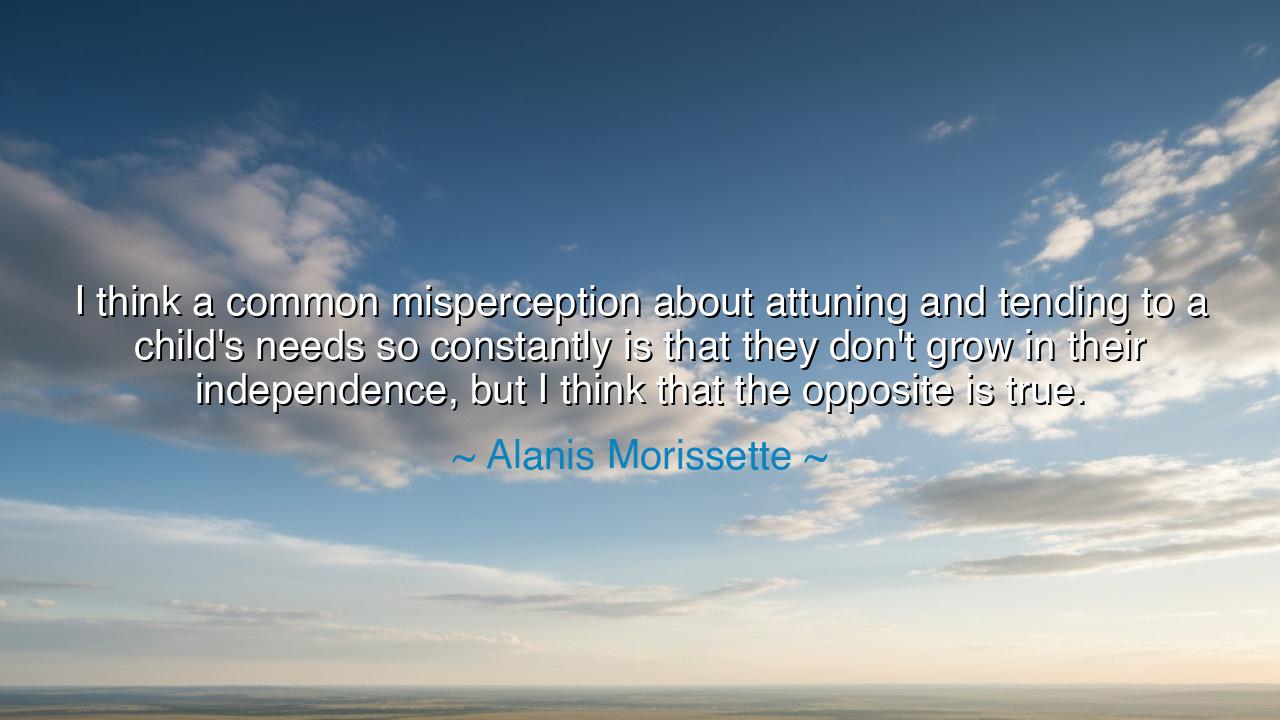
I think a common misperception about attuning and tending to a
I think a common misperception about attuning and tending to a child's needs so constantly is that they don't grow in their independence, but I think that the opposite is true.






Listen, O children of the future, for the words of Alanis Morissette carry a profound truth about the balance between care and independence. She declares, "I think a common misperception about attuning and tending to a child's needs so constantly is that they don't grow in their independence, but I think that the opposite is true." These words challenge a prevalent idea: that constant attention and nurturing hinder a child's ability to stand on their own. Instead, Morissette suggests that it is in carefully tending to a child's needs that we empower them to grow in strength, autonomy, and the ability to navigate the world with confidence. It is through love and support that we build the foundation for true independence, not through neglect or isolation.
In the ancient world, the role of the parent—and especially the mother—was understood as one of profound importance. The Spartans, for example, were a warrior society where the training of children was paramount. Mothers instilled in their children the values of strength, discipline, and self-reliance, but they did so not by withholding love and care, but by teaching the children to face the harsh realities of life with courage and resilience. It was through this constant and careful nurturing that the Spartan children grew into warriors capable of standing strong alone, yet deeply bound to their community and family. Their independence was built not by neglect, but by a mother’s fierce dedication to their upbringing.
Similarly, in ancient Rome, mothers played an essential role in shaping the character of their children. Cornelia, the mother of the Gracchi brothers, is an example of a woman who tended to the needs of her children not with overprotection, but with wisdom and guidance. She taught them the value of virtue, self-control, and justice, instilling in them the belief that true strength came from serving the greater good. Through her care, her sons grew into men of character who, despite their eventual downfall, left a lasting mark on Roman society. Cornelia’s nurturing did not hinder her children’s independence, but rather gave them the tools to pursue their own destinies with integrity.
Morissette’s insight echoes this ancient wisdom: the nurturing of a child’s emotional and physical needs lays the groundwork for their eventual independence. It is the secure foundation of love and attention that allows a child to feel safe enough to explore the world on their own, knowing that they are supported and valued. This care does not create dependence, but rather fosters confidence—the belief that they are capable of standing on their own when the time comes. The Indians of the plains understood this when they taught their young through storytelling, rituals, and community participation. By surrounding children with wisdom and attention, they grew up strong and independent, yet deeply connected to their culture and family.
The ancient Chinese also emphasized the role of the family in shaping independence. Confucius believed that the cultivation of virtue within the family was essential to the development of a person’s moral character. He taught that a child’s sense of duty and independence was rooted in their upbringing—the careful attention of parents who imparted wisdom, discipline, and love. To Confucius, the foundation of independence was not in being left to fend for oneself, but in learning from those who cared for and guided you. True freedom, he argued, comes from understanding your place in the world, which is only possible through nurturing care and guidance.
From these stories, we see the truth in Morissette’s words. The independence of a child is not something that comes from neglect or from leaving them to fend for themselves prematurely. It is born from the secure base of love, guidance, and nurturing care. Just as the ancient cultures understood, true independence comes when a child feels safe enough to stand on their own, knowing that they are loved and supported. It is this security that gives them the courage to explore the world, to take risks, and to learn from their experiences.
So, O children, the lesson from Morissette’s wisdom is clear: the path to independence is not through isolation, but through connection. Independence is not the absence of care, but the foundation built by it. Just as the ancients taught, a child’s ability to stand strong on their own comes from knowing that they have a secure foundation to return to, a place where they are valued and loved. As you walk through life, remember that independence is a process, and it begins with the tender care and attention that fosters the inner strength to face the world. In your own lives, offer this same nurturing to those you love, and in turn, you will give them the strength to grow into truly independent individuals.






AAdministratorAdministrator
Welcome, honored guests. Please leave a comment, we will respond soon